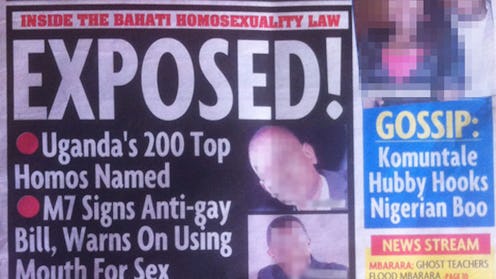News
Ugandan Tabloid "Outs" Gay Citizens

Just one day after President Yoweri Museveni signed Uganda's horrific anti-gay bill into law, one of the country's tabloids, the Red Pepper, published a list naming Uganda's "200 top homos." The tabloid "outed" a number of prominent Ugandans Tuesday, including activists, a hip-hop star, and a priest. Thanks to the Red Pepper's list, which has been called to as a "witch hunt," those on the list could now be subject to violence or jail time. Uganda's new law criminalizes being gay, and punishes "first-time offenders" with up to 14 years in prison; decrees that people who engage in gay sex face possible life sentences; and outlaws gay activism.
This isn't the first time a Ugandan tabloid has stooped to such levels — and, even with the introduction of Museveni's new law, it may be illegal. In 2010, a now-defunct newspaper called Rolling Stone (no relation to the music magazine) published a list of gay people in the country and called for them to be executed. After the list came out, a Ugandan gay activist named David Kato was killed. In response, a Uganda high court banned media from publishing similar lists.
Museveni says he signed the bill because Western nations are imposing homosexuality onto Africa, even going as far to say that groups are recruiting children to become gay. Nearly all of people polled in Uganda — 96 percent — believe homosexuality is unacceptable.
In an interview with CNN, Museveni even compared homosexuality to cannibalism.
Our scientists…argue it (homosexuality) is question of choice. Then really you have lost argument as far as these Ugandans are concerned. Because you can’t choose to be cannibal for instance. You cannot choose to be a cannibal to say that, to eat my child…Let’s say, my father died last year, so suppose I say I want to eat him. It’s my father, it’s my right. I want to eat him. Society will [not] allow me, will not accept. They will [say] something is wrong with you.
Efforts to get onto the Red Pepper's website were unsuccessful, presumably due to heavy traffic. However, the paper's Twitter account is full of unsound clickbait headlines, including this one.
And at least one journalist has debunked the length of the list.
The West's reaction to the law has been swift. Secretary of State John Kerry says the U.S. is conducting an "internal review" of its relationship with Uganda, which receives $400 million in U.S. aid.
And America isn't the only nation to threaten economic sanctions in light of this new law: Swedish officials have said they may suspend their $10 million yearly aid to Uganda, and the Netherlands halted a $9.6 million subsidy to Uganda's judicial system. Norway and Denmark vowed to transfer their combined $17 million in contributions to NGOs instead of the Ugandan government.
President Obama released a statement on the matter, urging "people everywhere should be treated equally." Some critics have taken him to task on his words, though, pointing out that the U.S. sells military arms to Saudi Arabia and other anti-gay, hyper-conservative countries.
And James Schneider, editor of Think Africa Press, wrote an editorial for the Independent that pointed out the West's reaction could actually worsen the situation for Uganda's LGBT community. According to Schneider, homosexuality was already illegal in the country, and creating such a furor will likely homophobia in Uganda. Since the West turned a blind eye to numerous other rights abuses, wrote Schneider, the suspension of foreign aid will only make Uganda's LGBT community the country's scapegoats.
Homophobia should be condemned in the strongest terms. But too often, the West uses universal rights rhetoric for other goals – increasing political support or to aid some other strategic interest. This inconsistency – or phony solidarity if we are being cynical – doesn't help Uganda's gay rights struggle, it certainly doesn't help other rights struggles and it could lead to further victimisation of an already victimised community.
Image: Twitter